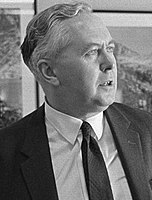Labour Government 1964–1970
| Wilson ministries | |
|---|---|
|
|

Wilson (1964)
|
|
| Date formed |
|
| Date dissolved |
|
| People and organisations | |
| Head of state | Elizabeth II |
| Head of government | Harold Wilson |
| Head of government's history | 1964–1970 |
| Deputy head of government | |
| Total no. of ministers | 339 appointments |
| Member party | Labour Party |
| Status in legislature | Majority |
| Opposition cabinet | |
| Opposition party | Conservative Party |
| Opposition leader |
|
| History | |
| Election(s) | |
| Outgoing election | 1970 general election |
| Legislature term(s) | |
| Predecessor | Douglas-Home ministry |
| Successor | Heath ministry |
Harold Wilson was appointed Prime Minister of the United Kingdom by Queen Elizabeth II on 16 October 1964 and formed the first Wilson ministry, a Labour Party government, which held office with a thin majority between 1964 and 1966. In an attempt to gain a workable majority in the House of Commons, Wilson called a new election for 31 March 1966, after which he formed the second Wilson ministry, a government which held office for four years until 1970.
The Labour Party won the 1964 general election by a majority of four seats. The Profumo affair had seriously damaged the previous Conservative government, meaning Alec Douglas-Home's Premiership lasted only 363 days. Wilson's tiny majority led to impotency during this Parliament, and in 1966 another election was called, leading to a majority of 96 and the continuation of the Wilson government.
A number of liberalising social reforms were passed through parliament during Wilson's first period in government. These included the near abolition of capital punishment, decriminalisation of sex between men in private, liberalisation of abortion law and the abolition of theatre censorship. The Divorce Reform Act 1969 was passed by Parliament (and came into effect in 1971). Such reforms were mostly via private member's bills on 'free votes' in line with established convention, but the large Labour majority after 1966 was undoubtedly more open to such changes than previous parliaments had been.
...
Wikipedia
